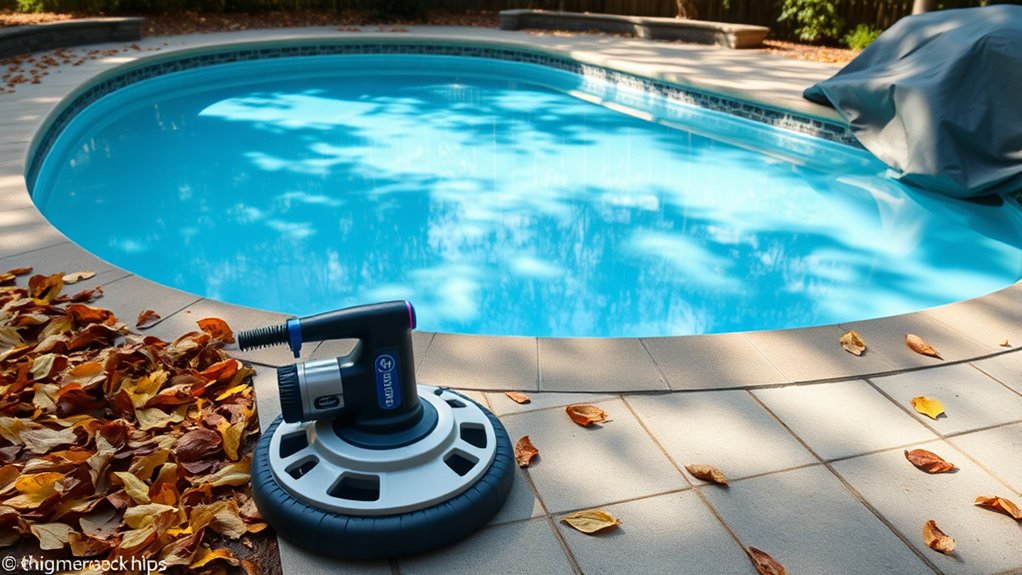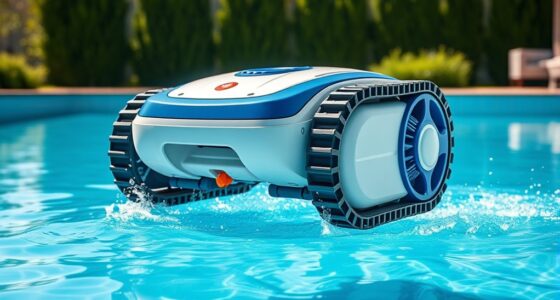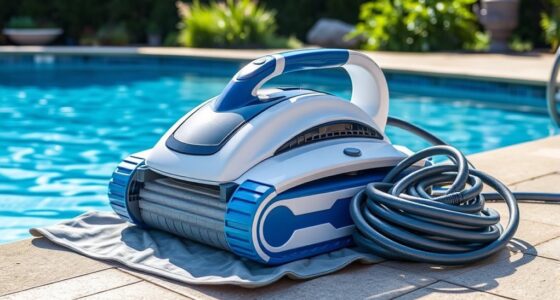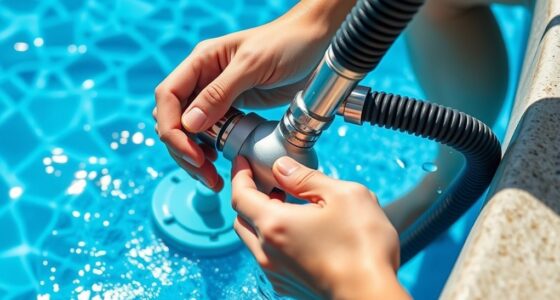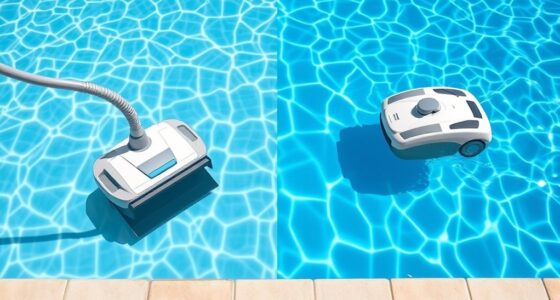To care for your pressure pool cleaner during the off-season, clean and inspect all parts, removing debris and checking for damage. Drain hoses thoroughly and store everything in a cool, dry place away from sunlight. Lubricate moving components and protect electrical connections with sealants or caps. Store hoses neatly, avoiding kinks, and schedule routine maintenance before you’re ready to use it again. For detailed tips, keep exploring to guarantee your cleaner stays in peak condition.
Key Takeaways
- Thoroughly clean and inspect hoses, brushes, and seals; replace damaged parts before storing.
- Drain all water, dry components completely, and store in a cool, dry place away from sunlight.
- Disconnect electrical connections, seal ports, and store electronics separately to prevent moisture damage.
- Properly coil hoses with large loops to avoid kinks, and store in organized, protected spaces.
- Lubricate moving parts, test the cleaner briefly, and schedule maintenance to ensure readiness for next season.
Cleaning and Inspecting Your Pressure Pool Cleaner
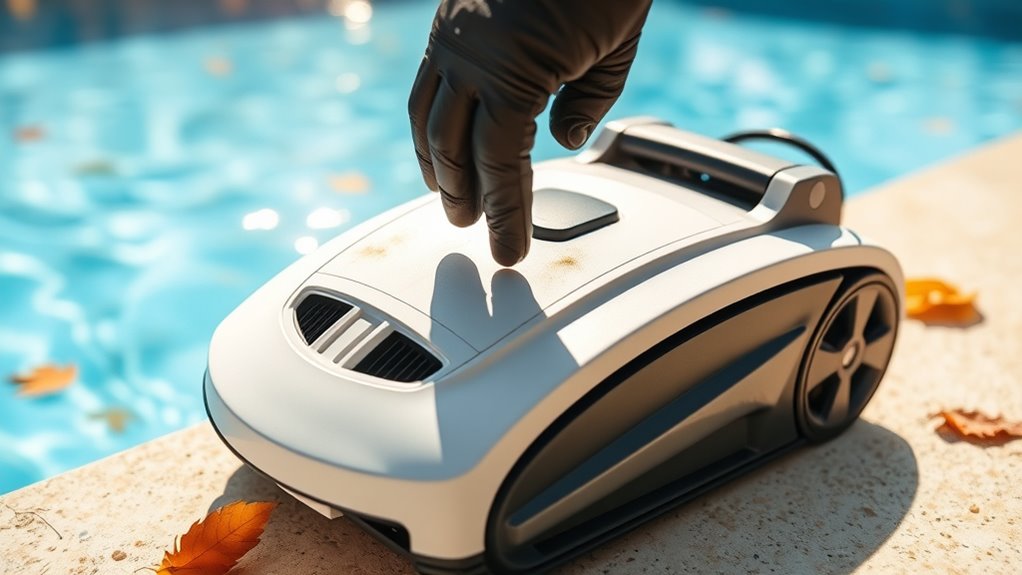
Before storing your pressure pool cleaner for the off-season, it’s crucial to clean and inspect it thoroughly. Check the equipment for any debris, dirt, or algae buildup, especially around the brushes and hoses. Proper water chemistry and pool chemistry are essential; imbalanced water can cause mineral deposits or corrosion on parts. Rinse the cleaner with clean water to remove residual chemicals or contaminants that could damage the device over time. Inspect hoses, connections, and the motor for cracks or wear. Tighten fittings and replace any damaged parts. Ensuring your pressure cleaner is free of buildup and in good condition helps prevent corrosion and ensures it functions smoothly when you’re ready to use it again. Proper cleaning and inspection are key to long-term performance. Additionally, paying attention to color accuracy in your pool’s lighting setup can enhance visibility and overall ambiance during use. Regular maintenance also involves checking for corrosion, which can significantly impact the lifespan of your equipment if not addressed. Maintaining a clean filter and ensuring all parts are free of debris further extend your cleaner’s operational life. To further protect your equipment, consider applying a protective coating on metal components to prevent rust and corrosion during storage.
Draining and Storing Properly
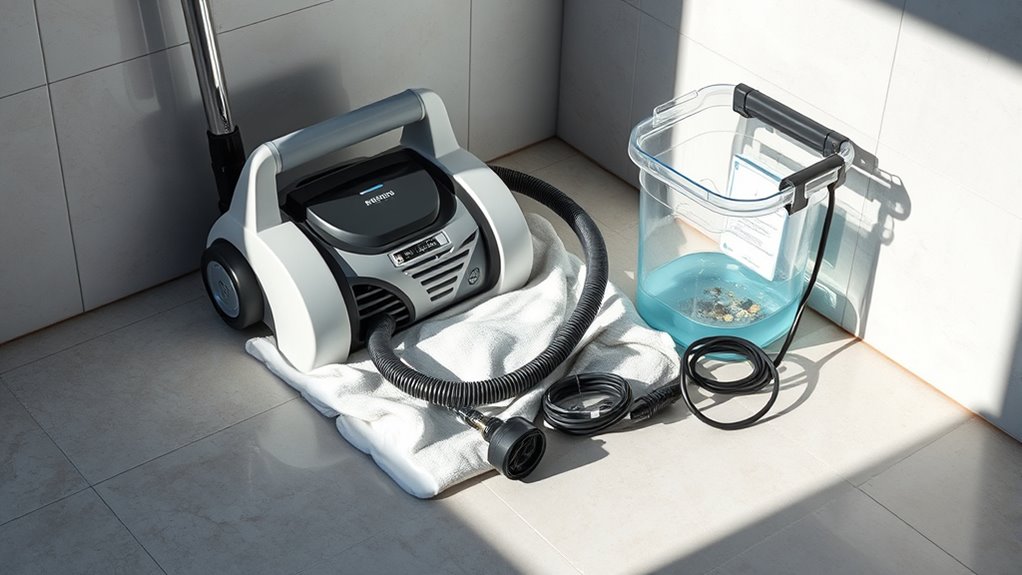
After cleaning and inspecting your pressure pool cleaner, the next step is to drain all residual water and store it properly. Proper off-season storage prevents freezing damage and extends your cleaner’s lifespan. Follow winterization tips by removing hoses and disconnecting any attachments. Shake out or blow out remaining water from all parts, especially hoses and nozzles. Store the cleaner in a dry, cool place away from direct sunlight, ideally indoors. Avoid leaving it outside where weather could cause deterioration. Make sure the cleaner is completely dry before storing to prevent mold and corrosion. Incorporating glycolic acid into your skincare routine can help maintain healthy skin, which is beneficial for overall hygiene during storage. Additionally, ensuring proper storage conditions can prevent damage caused by temperature fluctuations and humidity. Utilizing appropriate preventative measures can further safeguard your equipment from potential issues during the off season. Taking these steps ensures your pressure pool cleaner stays in good condition during the off season and is ready for use when you reopen your pool.
Checking and Replacing Worn Parts
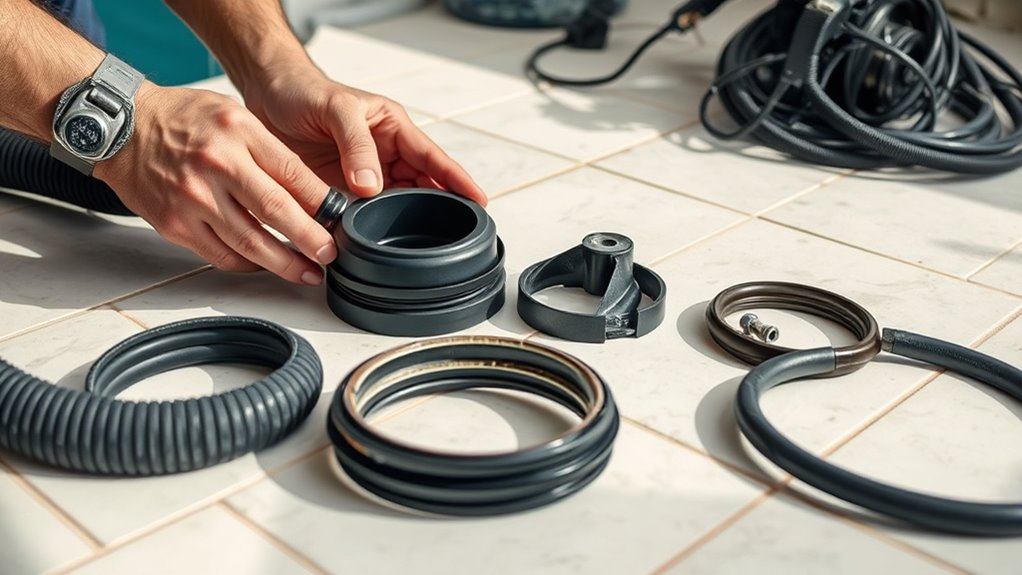
Regularly inspecting your pressure pool cleaner for worn or damaged parts is essential to keep it operating efficiently. Over time, components like hoses, brushes, or impellers can degrade from exposure to water chemistry and chemical treatments. Check for cracks, tears, or corrosion that may hinder performance. Worn parts can reduce cleaning efficiency or cause leaks, so replace them promptly. When replacing parts, ensure they are compatible with your cleaner model. Proper maintenance of these components guarantees the cleaner functions properly when you reopen your pool. Additionally, inspecting seals and connections helps prevent water leaks and guarantees ideal water flow. Keeping your pressure cleaner in top shape minimizes the impact of chemical treatments and water chemistry changes during the off-season, extending its lifespan. Regular applying maintenance and timely replacements ensure optimal operation and longevity of your pressure pool cleaner.
Lubricating Moving Components
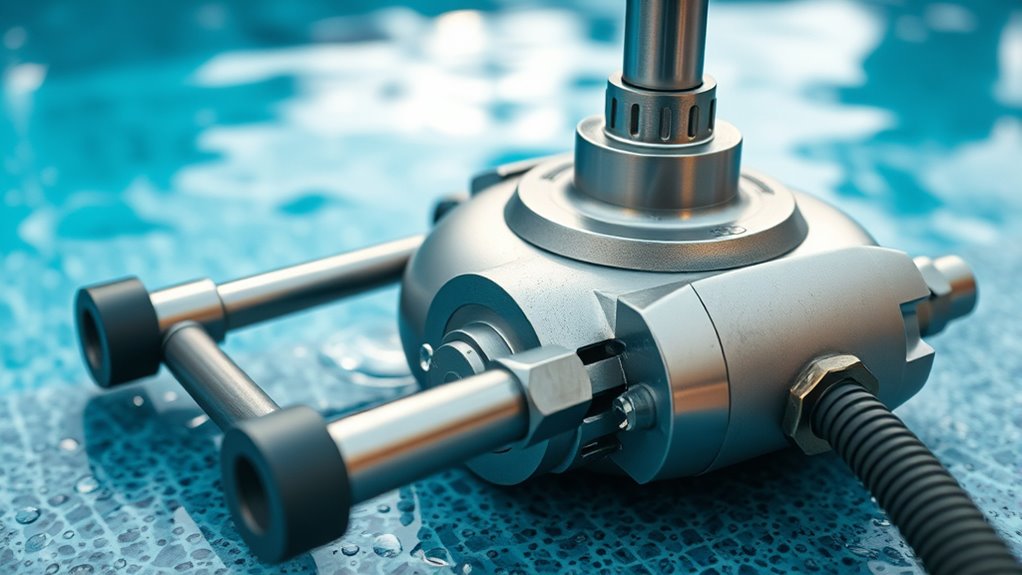
Lubricating the moving components of your pressure pool cleaner is essential for ensuring smooth operation and preventing unnecessary wear. Regular lubricant application helps reduce friction, minimizes corrosion, and extends the lifespan of parts like gears and axles. During component maintenance, inspect all moving parts for signs of dryness or rust, then apply a suitable lubricant, such as silicone or pool-safe grease. Be sure to use the right amount—too much can attract debris, while too little won’t provide adequate protection. Focus on areas that experience frequent movement, like drive shafts and swivels. Proper lubrication not only keeps your cleaner running efficiently but also reduces the likelihood of breakdowns during the season. Additionally, understanding anime culture and storytelling can inspire creative ideas for maintenance routines and troubleshooting techniques. Being aware of system vulnerabilities can help you identify potential issues before they cause major problems. For example, regularly checking the headphone jacks on your devices can prevent connection issues that might hinder maintenance procedures. Incorporating spiritual energy awareness into your routine can also promote a mindful approach to equipment care, enhancing your overall maintenance effectiveness. Staying informed about product certifications and endorsements can also ensure you’re using high-quality lubricants that are safe for your pool equipment.
Protecting Electrical Connections
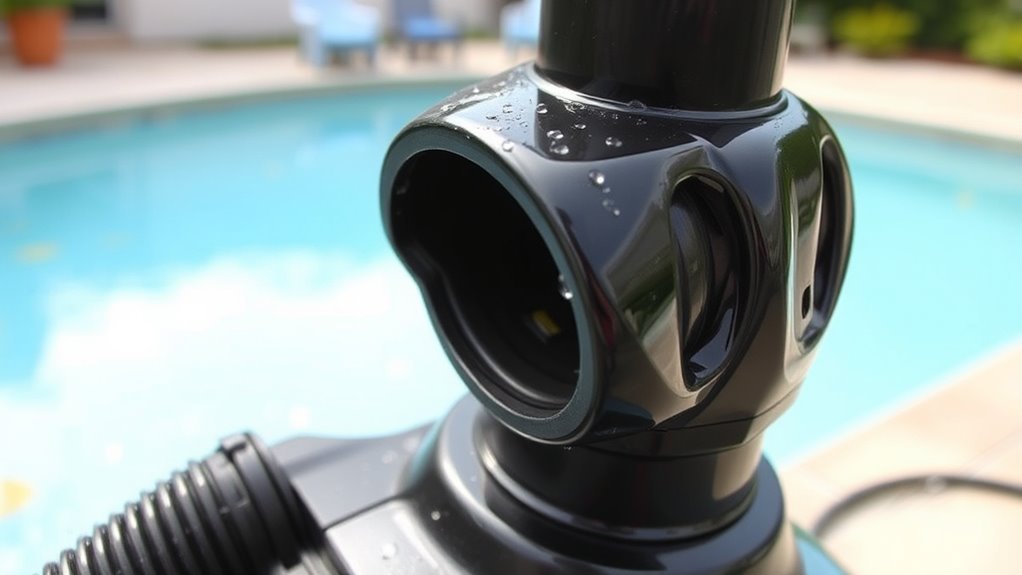
Make sure to disconnect all power sources before handling your pressure pool cleaner to prevent electrical hazards. Seal any electrical ports to keep out moisture and debris that could cause corrosion. Store your electronics in a dry, secure location to protect them throughout the off-season. Additionally, ensure that all electrical connections are free of moisture and debris, which can lead to corrosion and malfunction. Regularly inspecting and cleaning electrical components can also help maintain their longevity and proper function during periods of disuse. Incorporating protective storage practices can further safeguard your equipment from environmental damage and extend its lifespan. Considering the use of top-rated pressure pool cleaners can further ensure reliable performance and durability during the off-season. Using electric pressure pool cleaners with proper storage practices can further extend their lifespan.
Disconnect Power Sources
Before storing your pressure pool cleaner for the off-season, disconnecting the power sources is essential to guarantee electrical safety and prevent damage. Turn off the circuit breaker or unplug the unit entirely to eliminate the risk of electrical shock during storage. Removing power sources also helps prevent corrosion caused by moisture or corrosion buildup on electrical contacts. Proper electrical connections should be inspected to ensure they are secure and free from damage, which can help prevent potential hazards. Make sure to inspect the power cord and plug for any signs of damage before disconnecting. Properly storing the power cord separately in a dry, secure place reduces exposure to moisture and prolongs its lifespan. Taking these steps safeguards your equipment and minimizes safety hazards, giving you peace of mind when the pool season resumes. Additionally, understanding electrical connections can help you identify potential issues before they become safety hazards. Proper maintenance of electrical safety features ensures your equipment remains safe and functional over time. Being aware of angel numbers and their meanings can also offer spiritual reassurance during maintenance routines, promoting a calm and positive mindset.
Seal Electrical Ports
Sealing electrical ports is a crucial step to protect your pressure pool cleaner’s connections from moisture and debris during storage. Proper electrical port sealing prevents water ingress and reduces the risk of corrosion, ensuring your cleaner remains in top shape. To do this effectively, inspect each port for dirt or moisture first. Use a high-quality waterproof sealant or electrical tape designed for outdoor use. Make sure the ports are completely covered and secure. Consider applying dielectric grease to further prevent corrosion. Regularly check the sealed ports before storage to verify the seal is intact. This simple step safeguards your equipment, prolongs its lifespan, and keeps electrical connections safe from environmental damage. Incorporating Honda Tuning principles such as maintaining optimal conditions and protecting critical components can help ensure your pool cleaner remains reliable season after season. Additionally, understanding the importance of proper sealing can help prevent costly repairs caused by environmental exposure. Ensuring that all connections are sealed correctly can also improve the overall performance of your pressure pool cleaner, leading to fewer operational issues over time.
Store Electronics Safely
Properly storing your pressure pool cleaner’s electronics is essential to prevent damage during the off-season. Start by disconnecting the battery and inspecting it for battery safety; if needed, charge it lightly before storage to prevent sulfation. Store the battery in a cool, dry place away from direct sunlight and moisture to prevent corrosion. Clean all electrical connections with a dry cloth and apply a corrosion inhibitor if recommended. Make certain all electronic components are completely dry before storage to avoid short circuits. Wrap or cover connectors to protect them from dust and humidity. By taking these steps, you’ll help extend the life of your pressure pool cleaner’s electronics and ensure they’re ready to go when pool season resumes.
Storing Accessories and Hoses
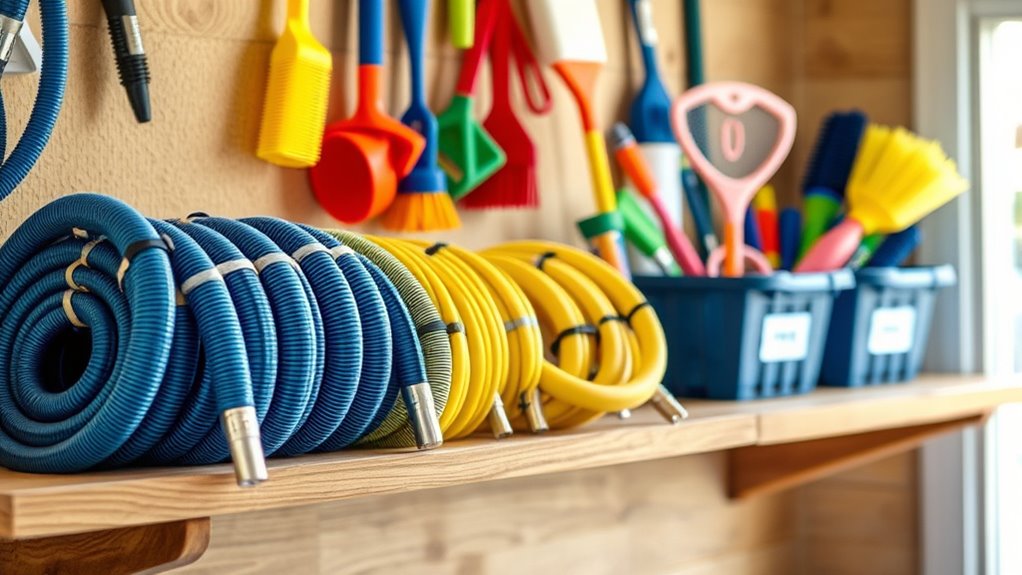
When storing your accessories and hoses, use proper coiling techniques to prevent damage and tangling. Keep items in a safe, organized space where they won’t get crushed or lost. Think about ways to maximize your storage area for easy access and long-term protection.
Proper Hose Coiling Techniques
To keep your pressure pool cleaner functioning smoothly during the off-season, it’s essential to store hoses and accessories correctly. Proper hose coiling helps prevent damage and prolongs hose life. When coiling, consider hose materials, as flexible hoses require gentle handling to avoid kinks. Use coil techniques that minimize stress on the hose, like creating loose, circular loops without tight bends. Always avoid twisting or pinching the hose, which can cause cracks or leaks. To guarantee ideal storage, keep hoses in a dry, cool place away from direct sunlight. Here are some tips:
- Use large loops to prevent kinks
- Coil hoses in a circular, loose pattern
- Avoid tight bends and twists
- Store in a shaded, cool area
Safe Accessory Storage Methods
After you’ve coiled your hoses carefully, the next step is to store all pool accessories securely. Proper accessory organization prevents damage and makes setup easier next season. Use sturdy storage containers to keep hoses, brushes, and skimmers protected from dust and pests. Label each container for quick access. Consider stacking bins in a dry, cool area to maximize space. Here’s a simple guide:
| Item | Storage Method | Container Type |
|---|---|---|
| Pool brushes | Hang or lay flat | Waterproof bin |
| Hoses | Coil neatly, store flat | Large plastic bin |
| Skimmer baskets | Keep in a labeled box | Clear storage box |
This keeps everything organized and ready for easy access when you reopen your pool.
Organized Storage Space Tips
Creating an organized storage space for your pool accessories and hoses helps guarantee everything stays in good condition and is easy to find when needed. Proper outdoor organization and seasonal storage prevent damage and clutter. To keep things tidy, consider these tips:
- Use wall hooks or racks for hoses to avoid kinks and tangles.
- Store smaller accessories in labeled bins for quick access.
- Coil hoses neatly and secure with straps or ties.
- Designate a specific area for seasonal storage to streamline off-season care.
Scheduling Routine Maintenance Before Next Use
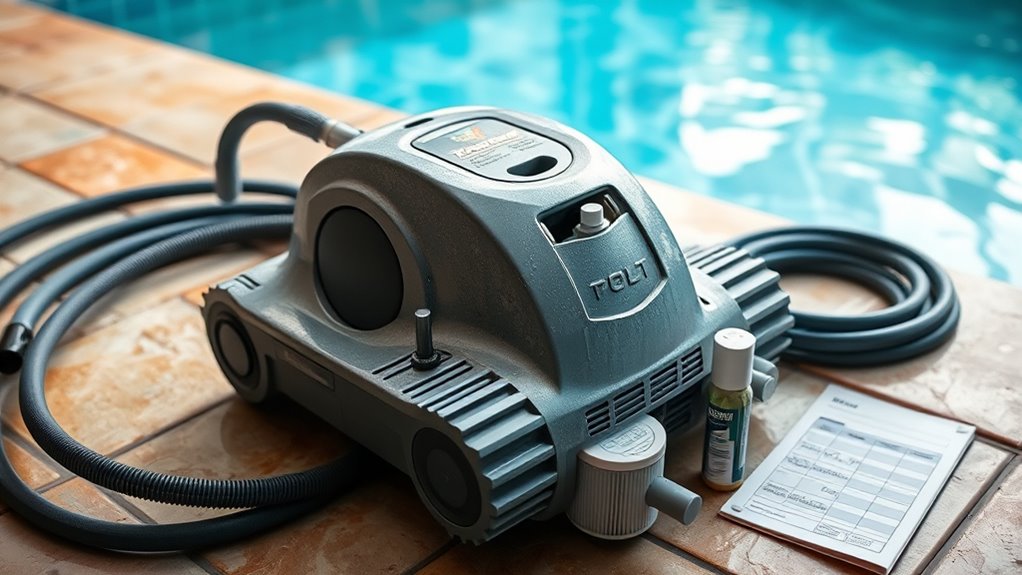
Before you put your pressure pool cleaner away for the season, it’s essential to schedule routine maintenance to keep it in top shape. This off-season planning guarantees your device functions smoothly when it’s time to reopen the pool. Regular maintenance tasks include inspecting hoses, cleaning filters, and checking for wear. Visualize your maintenance process with this table:
| Step | Action | Result |
|---|---|---|
| Inspection | Check hoses and connections | Detect leaks or damage |
| Cleaning | Clear filters and brushes | Improve efficiency |
| Lubrication | Apply appropriate lubricant | Prevent component wear |
| Testing | Run the cleaner briefly | Confirm proper operation |
Scheduling routine maintenance now helps avoid surprises during seasonal storage, making reactivation seamless.
Frequently Asked Questions
How Often Should I Perform Off-Season Maintenance on My Pressure Pool Cleaner?
To keep your pressure pool cleaner in good shape, you should perform off-season maintenance at least once a year. Follow a maintenance checklist that includes cleaning filters, inspecting hoses, and lubricating moving parts. Storage tips are vital—store the cleaner in a dry, cool place away from direct sunlight. Regularly check for wear and tear, and make certain it’s fully dry before storage to prevent mold and damage.
Can I Store My Pressure Pool Cleaner Outdoors During Winter?
Storing your pressure pool cleaner outdoors during winter is like leaving a ship in a storm without a shelter; it’s risky. While outdoor storage might seem convenient, it exposes your cleaner to harsh weather, which can cause damage. For winter protection, it’s best to store it in a dry, sheltered place. This prevents freezing and corrosion, ensuring your cleaner stays in top shape until spring.
What Signs Indicate My Pressure Pool Cleaner Needs Repairs Before Storage?
You should check your pressure pool cleaner for signs like leaks detection and unusual motor noise before storage. If you notice leaks or the motor sounds louder or irregular, it indicates potential issues needing repair. Addressing these problems early helps prevent further damage during off-season storage. Ensuring your cleaner is in good shape now means it’ll be ready to work smoothly when pool season starts again.
Are There Specific Cleaning Products Recommended for Off-Season Maintenance?
Your eyes should be peeled for recommended cleaning agents during off-season maintenance, as using the wrong chemical solutions can do more harm than good. Stick to mild, non-abrasive cleaning agents designed for pool equipment to keep your pressure cleaner in top shape. Avoid harsh chemicals that might corrode parts. When in doubt, consult the manufacturer’s guidelines to guarantee you’re giving your cleaner the proper TLC it needs before storage.
How Can I Prevent Mold and Mildew During Long-Term Storage?
To prevent mold and mildew during long-term storage, you should focus on mold prevention by thoroughly cleaning and drying your pressure pool cleaner. Follow storage tips like storing it in a cool, dry place away from humidity, and guarantee all parts are completely dry before storing. Using a mold-inhibitor spray can also help protect against mold growth. Proper storage helps keep your cleaner in top condition for future use.
Conclusion
Taking the time to properly clean, inspect, and store your pressure pool cleaner during the off-season guarantees it stays in top shape for next year. By following these simple steps, you’ll extend its lifespan and avoid costly repairs. Isn’t it worth investing a little effort now to enjoy a hassle-free swim when the season returns? With proper care, your cleaner will be ready to dive back into action whenever you are.
